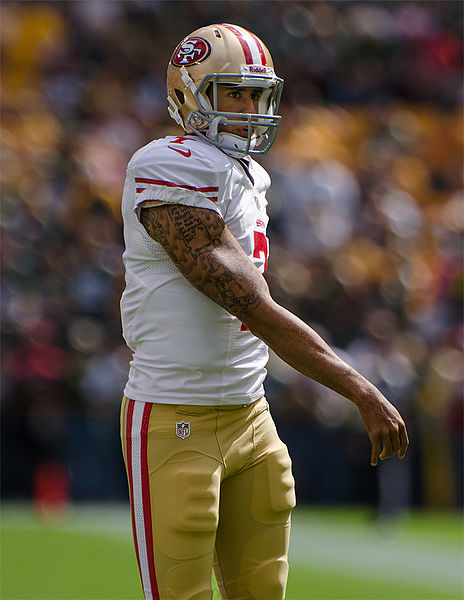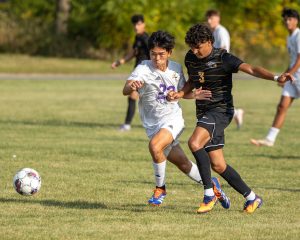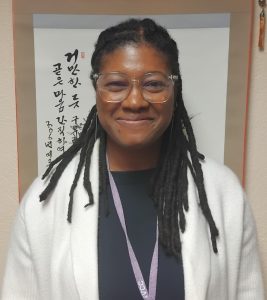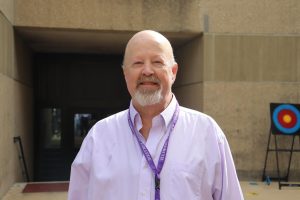What about our freedom of speech
Social injustice takes a toll

Mike Morbeck photo from Wikimedia Commons
Taking a Stand Former San Francisco 49ers quarterback Colin Kaepernick’s controversial actions have started a national dialogue.
October 12, 2017
Kaepernick has started a movement for those who believe America has its faults. It was a year ago that Kaepernick began sitting and kneeling during the national anthem. However, well after he became a free agent, not having been seen kneeling or sitting again, there is still much talk about the rebellious former quarterback.
It was shocking to say the least when Colin Kaepernick first began to express his freedom of speech on Aug. 14, 2016. He sat the first two preseason games on Aug. 14 and 20 before he was finally noticed in a picture tweeted by Jennifer Lee Chan, a beat writer for the San Francisco 49ers. The picture featured the whole team. All but Kaepernick were standing. He was sitting.
However, Kaepernick didn’t just go from sitting to kneeling all on his own. No. He was invited to kneel by former Seahawks player, Nate Boyer. Boyer wrote to Kaepernick and the two met for an open meeting. Boyer had said to him, “soldiers take a knee in front of a fallen brother’s grave, you know, to show respect. When we’re on a patrol, you know, and we go on a security halt, we take a knee, and we pull security.
His quiet protest continued for the regular season which upset many NFL consumers. But why did Colin Kaepernick take his stand?
“I am not going to stand up to show pride in a flag for a country that oppresses black people and people of color,” said Kaepernick to the NFL Network’s Steve Wyche.
And that is exactly the kind of resistance that is harbored by many persons of color from such a young age. Our country can accept the general “white privilege” and lack of rights for people of color, but when it comes to individual stories from people of color, the prominent voice of the nation has refused to accept it.
Kaepernick explains his motives.
“I love America,” said Kaepernick to the New York Times. “I love people. That’s why I’m doing this. I want to help make America better. I think having these conversations helps everybody have a better understanding of where everybody is coming from.”
Kaepernick is a peaceful voice for many. Since his protest, many people have followed in support. Since September 2016, teammates and members from other teams began to kneel in support. In women’s soccer, Megan Rapinoe took a knee as a nod of support. And even more amazingly, Garfield High School’s entire football team in Seattle took a knee.
That last bit about the high school kneeling during the national anthem set sparks off at the academy I graduated from, causing the coach to speak out and lay down the law that anyone kneeling would sit out the entire game.
The list goes on. However, Kaepernick has been a free agent since March 3, 2017. As the league works out whether he will be hired again, let it be known that Kaepernick made a peaceful protest. It was a protest that stood for the loss of black lives and the mistreatment of people of color due to cops who are not “found guilty” of murder while on paid leave.
Although many affected cops can argue the paid leave was a small sum to pay their family’s way of survival, the verdict of “not guilty” sickens many of American citizens solely on beliefs that a life is a life, and taking one does make you a murderer.
However, where Black Lives Matter and supporters rally in cries for justice, many others claim the deaths of these mostly innocent people are justified because of a criminal background, therefore rendering their lives useless.
This has a personal element for me. I grew up in three different worlds. I grew up in poverty within an urban community. In another, I grew up in a rural area on a farm. In the other, I stayed to grow into an adult in a rich subdivision just outside of the suburbs. There was not much difference between them except the overwhelming sense of oppression and racial views in the suburbs and the rural communities.
I entered my senior year at a private school back in 2014. With two years already at the private academy, I was filled with mixed feelings and a lack of belonging outside of sports. No amount of importance and influence I had in the sports I was a starter in would be enough to stop any racial attachment my name from my peers.
So, I began my own silent protest. I began sitting during the Pledge of Allegiance one Monday which did not help my social life. My peers were disgusted and often jeered quietly and out of vocal range of the teacher. By the end of the week, the teacher had finally caught on. Although my homeroom teacher did not force me to stand, I still received racial banter and some chants to return to Africa, a country I have never been to from my peers.
The world is a playground and we are the children playing. When it does not go our way, we handle the situation by advising the authority to defuse the situation. The “authority” should not ignite a playground war between the opposing children. Therefore, we should not allow the “authority” to take matters into its hands and be above the law as if we have returned to the war on drugs.



